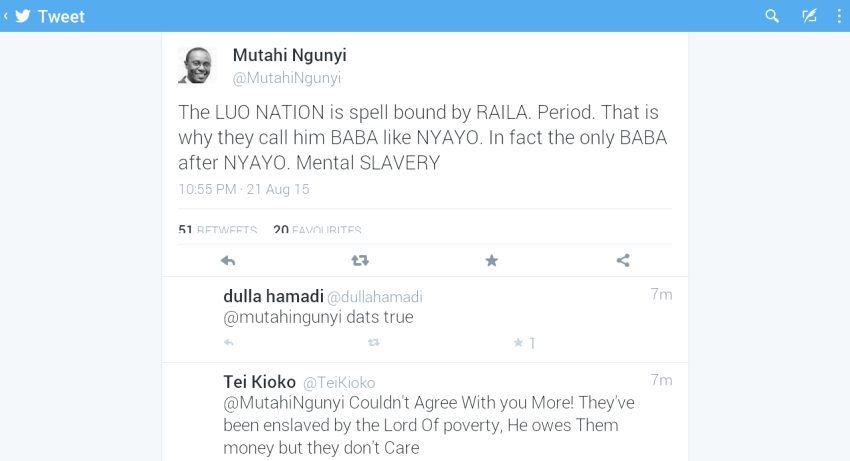Social Media, Free Speech and Criminal Justice: High Court Ruling in Mutahi Ngunyi v Director of Public Prosecutions & 4 Ors
- Victor Nzomo |
- January 20, 2016 |
- CIPIT Insights,
- Social Media and the Law

On January 16th 2016, popular social media-savvy journalist Larry Madowo posted the tweet captioned above in reference to a list of alleged corrupt public officials disclosed by Raila Odinga, of Luo descent, a former Prime Minister and currently leader of the Orange Democratic Movement (ODM) party in the Opposition. The uproar and outrage from Raila supporters on social media was incredible. One Raila supporter reportedly chided Madowo in the following terms: “Kneel at the shores of Lake Victoria and call the name of Raila three times at the full glare of cameras…Then present a black goat without blemish to The Luo Council of elders. Raila is an institution not an individual.”
In response, Madowo devoted his weekly op-ed piece to this social media storm and it reads in part: “My Twitter lit up as his supporters incorrectly assumed I had accused the CORD leader of farting in public. I did not abuse him and I greatly respect the statesman for all he has done for Kenya. (…) But the outrage machine kicked in without understanding the metaphor and I was eviscerated (…) I was insulted in every way possible by thousands on social media and there were more than a few credible threats to my life which I will be reporting to the police. Several people even promised physical violence should I show up at certain places.”
In a country where almost everything is subject to politicisation and ethnic profiling, any tweet about Kenya in Kenya could land you in a Kenyan police station, court of law or even, jail. This fact has been highlighted countless times in previous blogposts here. One recent incident where the criminal justice machinery has been used to limit freedom of expression is, perhaps, the case of Mutahi Ngunyi and his tweets, including the one appearing directly below.

In court documents, Dr. Mutahi Ngunyi describes himself as “a political scientist and a public intellectual trained to describe, explain and predict political activity, processes and relations.” In August 2015, Ngunyi posted a series of tweets (including the one captioned above) about Raila Odinga and the Luo tribe. In the wake of Ngunyi’s tweets, it is claimed that “some Kenyans complained” and that finally the National Cohesion and Integration Commission (NCIC) “got involved”. NCIC summoned Ngunyi as it set to investigate the allegedly offending tweets. A few weeks later, NCIC issued a press statement stating that it reached the decision that Ngunyi be charged with the offence of ethnic contempt contrary to Section 62 (1) of the National Cohesion and Integration Commission Act relating to the tweets posted by Ngunyi on his twitter account.
It is NCIC’s decision and press statement that prompted Ngunyi to file a Petition in the High Court seeking interim conservatory orders to stay his intended prosecution pending the outcome of the Petition. The High Court ruled in the case of Godfrey Mutahi Ngunyi v Director of Public Prosecutions & 4 others [2015] eKLR that Ngunyi had not met the required threshold for interim conservatory orders against the State. A copy of the ruling is available here.
In arriving at its decision, the court disagreed with the arguments of Ngunyi’s counsel that this was a case of selected prosecution since there are many others who have tweeted similar sentiments about Raila including those who retweeted and tweeted in support of Ngunyi’s tweets. In this regard, the learned judge stated:
“I am not aware of any law that dictates that all participants in a twitter trail must be charged together. In the absence too of any specifics and particulars of those selectively not prosecuted, I am not satisfied that the Applicant [Ngunyi] has, on a prima facie basis, demonstrated any favoritism or discrimination. Besides, the 1st Respondent [Office of the DPP] only has the liberty to prefer charges against a party in respect of whom he finds sufficient evidence”
This statement leaves the door open for Ngunyi to revisit their Article 27 infringement argument during the trial as to whether there is “sufficient evidence” tabled in court to show why charge was preferred only against Ngunyi and whether indeed all the elements of the offence are present.
While the court agrees that tweets are protected under free speech, Ngunyi’s legal team is faulted for not sufficiently demonstrating that the intended prosecution would infringe his right to freedom of expression under Article 33 of the Constitution. The learned judge’s preliminary finding on this matter is as follows:
“Apart from the restatement in the Petition that the intended prosecution would run counter to and offend the provisions of Article 33, no mention of the alleged violation was made either in the course of arguments or in the Applicant’s [Ngunyi’s] supporting affidavits. A cursory reading of Article 33 of the Constitution would reveal that the right to freedom of expression is not absolute and further that it does not extend to hate speech, propaganda for war , incitement to violence or advocacy of hatred which would constitute ethnic incitement. It is not enough therefore for the Applicant to merely contend that his tweets, which is one way of expressing oneself, are protected under Article 33 of the Constitution.”
From the above finding, the stage is now set for a judicial precedent on the limits of freedom of expression in the context of social media. It is evident that the outcome of this case will be of great importance in the quest to balance public interest and private rights under the Constitution and laws of Kenya.
